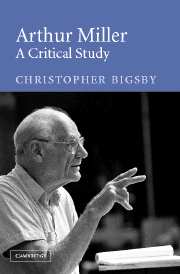Book contents
- Frontmatter
- Contents
- Acknowledgements
- Note on the text
- Introduction
- 1 The Michigan plays
- 2 The Golden Years, The Half-Bridge, Boro Hall Nocturne
- 3 The radio plays
- 4 The Man Who Had All the Luck
- 5 Focus
- 6 All My Sons
- 7 Death of a Salesman
- 8 Arthur Miller: time-traveller
- 9 An Enemy of the People
- 10 The Crucible
- 11 A Memory of Two Mondays
- 12 A View from the Bridge
- 13 Tragedy
- 14 The Misfits
- 15 After the Fall
- 16 Incident at Vichy
- 17 The Price
- 18 The Creation of the World and Other Business
- 19 The Archbishop's Ceiling
- 20 Playing for Time
- 21 The shearing point
- 22 The American Clock
- 23 The one-act plays: Two-Way Mirror, and Danger: Memory!
- 24 The Ride Down Mount Morgan
- 25 The Last Yankee
- 26 Broken Glass
- 27 Mr Peters' Connections
- 28 Resurrection Blues
- 29 Finishing the Picture
- 30 Fiction
- 31 Arthur Miller as a Jewish writer
- Notes
- Index
27 - Mr Peters' Connections
Published online by Cambridge University Press: 16 November 2009
- Frontmatter
- Contents
- Acknowledgements
- Note on the text
- Introduction
- 1 The Michigan plays
- 2 The Golden Years, The Half-Bridge, Boro Hall Nocturne
- 3 The radio plays
- 4 The Man Who Had All the Luck
- 5 Focus
- 6 All My Sons
- 7 Death of a Salesman
- 8 Arthur Miller: time-traveller
- 9 An Enemy of the People
- 10 The Crucible
- 11 A Memory of Two Mondays
- 12 A View from the Bridge
- 13 Tragedy
- 14 The Misfits
- 15 After the Fall
- 16 Incident at Vichy
- 17 The Price
- 18 The Creation of the World and Other Business
- 19 The Archbishop's Ceiling
- 20 Playing for Time
- 21 The shearing point
- 22 The American Clock
- 23 The one-act plays: Two-Way Mirror, and Danger: Memory!
- 24 The Ride Down Mount Morgan
- 25 The Last Yankee
- 26 Broken Glass
- 27 Mr Peters' Connections
- 28 Resurrection Blues
- 29 Finishing the Picture
- 30 Fiction
- 31 Arthur Miller as a Jewish writer
- Notes
- Index
Summary
In the plays of the 1980s and 90s, Miller's characters seem to come under increasing pressure. They spiral down into depression, fragment into competing personalities, lose their grasp on the past, base their ethical systems on nothing but their own desires elevated to moral principle. The external world becomes a kind of theatre in which they play roles as though performance were itself a value, while the internal world seems to lose definition. His increasing distaste for a society that seemed to offer little by way of community and nothing in terms of transcendence, led him to write plays in which the very structure of meaning seemed insecure. These were plays in which characters struggle to make sense of themselves and a world bereft of certainties. His next two plays, indeed, were mordant comedies about a society seemingly in decline, an existence apparently without direction or purpose.
In 1998, came a play, Mr Peters' Connections, which seemed appropriate to a playwright in his eighty-third year, writing as a decade, a century and a millennium slowly wound down. It was, he suggested, ‘a crazy comedy’ in which ‘a man is confronting his own death and wrestling with the inconsequential nature of what he conceives his life to have been, because he can't find a meaning for the whole affair’. As he said at the time of the British production in July 2000, ‘It's tough to be near death and have to think that there's no definition to your life.
- Type
- Chapter
- Information
- Arthur MillerA Critical Study, pp. 405 - 420Publisher: Cambridge University PressPrint publication year: 2004



